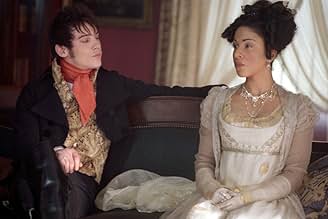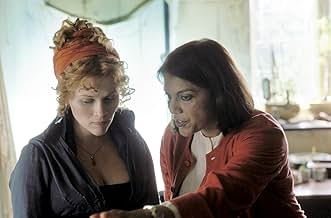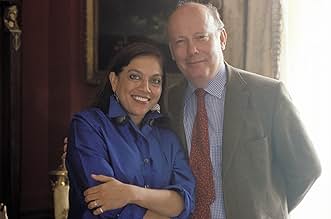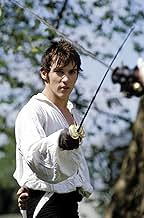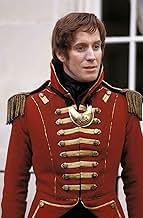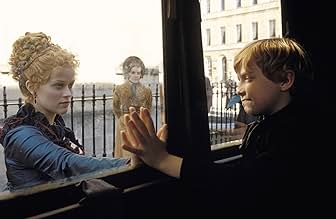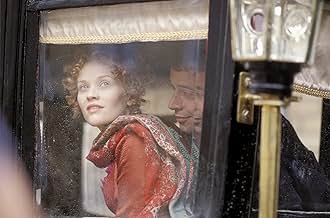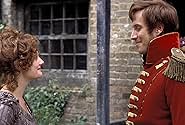CALIFICACIÓN DE IMDb
6.2/10
24 k
TU CALIFICACIÓN
La inteligente y luchadora hija de un pintor fallecido comienza a ascender en una sociedad que aleja a las mujeres del reconocimiento.La inteligente y luchadora hija de un pintor fallecido comienza a ascender en una sociedad que aleja a las mujeres del reconocimiento.La inteligente y luchadora hija de un pintor fallecido comienza a ascender en una sociedad que aleja a las mujeres del reconocimiento.
- Dirección
- Guionistas
- Elenco
- Premios
- 2 premios ganados y 5 nominaciones en total
Lillete Dubey
- Ms. Green
- (as Lillette Dubey)
Opiniones destacadas
6=G=
"Vanity Fair" (2004) is an acceptable but abbreviated version of the classic Thackery Victorian period novel which tells of Becky Sharp (Witherspoon), who uses artifice and charm to climb from lowly governess to aristocrat, always able to find a suitable family of peerage or property to use as a rung in her ladder to the top in spite of the tribulations of the time. At just over two hours, this film cannot deal in depth with the many characters in the story and has to content itself with hitting the high points which make for a very condensed telling suited to those who only wish the flavor of the story. Those with a particular interest in Victorian pulp fiction or more expansive dramas should turn to the BBC's 1998 six hour miniseries which offers greater character depth, a presentation much more true to the period, and a very much better cast. (B-)
In many ways, director Mira Nair is a daring, imaginative choice to helm this latest film adaptation of William Makepeace Thackeray's classic novel of social mores in early 19th century England. But the end result of her vision is on the whole, rather disappointing. What could have been an energetic distillation of the book's themes turns into a lengthy episodic movie suffering from poor pacing and softened characters. It is a feast for the eyes though, as it appears Nair is intent on bringing her native India into the film as much as possible from the brightly colored period costumes to the contemporary-looking exotic dance at the Marquess of Steyne's party (with very anachronistic Rai music in the background) to the happy ending atop an elephant in Jodhpur. All these references remain true to the Calcutta-born author's story, and actually they feed into the English imagination of what India meant to them at the time. At the same time, the images are too overwhelming to make the basic story of Becky Sharp resonate as it should. Her evolution is the heart of the story, as she moves from finishing school outsider to resourceful governess to brave captain's wife to fallen woman in a casino. It's a long, rocky journey, almost too long for a 137-minute movie to bear as it turns out. Nair, however, also has a good handle on the comic banter among the characters, and it certainly helps that she has assembled a "Who's Who" of British stage and film in all the roles except the primary one.
As Becky, Reese Witherspoon gives it a valiant effort and perfects her British accent to Gwyneth Paltrow's standards, but she seems to be channeling a hybrid of her Elle Woods ("Legally Blonde") and her Tracy Flick (in Alexander Payne's "Election") by way of Kate Winslet in "Sense and Sensibility". When facing down her opponents in her climb upward, especially in the early scenes, the performance seems right. But when her character takes on Scarlett O'Hara dimensions in wartime suffering and acts of betrayal, she seems young and overwhelmed, and her reactions come across as too modern to be true to the character's evolution as intended. This anomaly results in a Becky Sharp who is not so much an ambitious social climber but a plucky heroine for the underclasses, a textbook example of a Tony Robbins motivational seminar. This transformation may seem endearing to those looking for nicely wrapped tales of triumph against all odds, but it doesn't lend credibility to the more pointed satire and harsher criticisms that Thackeray had in mind when he wrote the book. For example, Becky's gambler husband, Rawdon Crawley, is really more of a ne'er-do-well whose departure in the story should be viewed somewhat as relief, but as played by James Purefoy, he is a romantic figure who is guilt-ridden over his failure to provide for his family. The change could have been acceptable were it not for the fact that his character is discarded in an almost matter-of-fact way. The same sketchy treatment is given to Becky's only friend, Amelia Sedley, played by Romola Garai, who is set up as a contrast to Becky and comes across as a wet rag for much of the story. But the film transforms her into a brave widow whose romantic resolution at the end strains credibility. Somehow Purefoy and Garai acquit themselves admirably regardless.
There are many fine performances in the smaller roles. Worth mentioning are Jim Broadbent as roguish George Osborne's unforgiving father, Bob Hoskins as the clownishly pitiable Sir Pitt; Gabriel Byrne as the territorially devious Marquess of Steyne, and Geraldine McEwan's helium-voiced Lady Southdown. Best of all is the mordantly witty Eileen Atkins, who seems to understand the tone of Thackeray's story better than anyone else, and lends a dotty authority to the role of Aunt Mathilde, serving as the primary catalyst of Becky's social escalation much to her later regret. Great acting aside, the film's length does have a wearing effect since the climax does not bear the emotional weight of everything that has gone before it, and unfortunately the plot strands get wrapped up much too quickly at the end to make the story truly resonate. That's a shame since there is so much creative energy obviously at work here.
As Becky, Reese Witherspoon gives it a valiant effort and perfects her British accent to Gwyneth Paltrow's standards, but she seems to be channeling a hybrid of her Elle Woods ("Legally Blonde") and her Tracy Flick (in Alexander Payne's "Election") by way of Kate Winslet in "Sense and Sensibility". When facing down her opponents in her climb upward, especially in the early scenes, the performance seems right. But when her character takes on Scarlett O'Hara dimensions in wartime suffering and acts of betrayal, she seems young and overwhelmed, and her reactions come across as too modern to be true to the character's evolution as intended. This anomaly results in a Becky Sharp who is not so much an ambitious social climber but a plucky heroine for the underclasses, a textbook example of a Tony Robbins motivational seminar. This transformation may seem endearing to those looking for nicely wrapped tales of triumph against all odds, but it doesn't lend credibility to the more pointed satire and harsher criticisms that Thackeray had in mind when he wrote the book. For example, Becky's gambler husband, Rawdon Crawley, is really more of a ne'er-do-well whose departure in the story should be viewed somewhat as relief, but as played by James Purefoy, he is a romantic figure who is guilt-ridden over his failure to provide for his family. The change could have been acceptable were it not for the fact that his character is discarded in an almost matter-of-fact way. The same sketchy treatment is given to Becky's only friend, Amelia Sedley, played by Romola Garai, who is set up as a contrast to Becky and comes across as a wet rag for much of the story. But the film transforms her into a brave widow whose romantic resolution at the end strains credibility. Somehow Purefoy and Garai acquit themselves admirably regardless.
There are many fine performances in the smaller roles. Worth mentioning are Jim Broadbent as roguish George Osborne's unforgiving father, Bob Hoskins as the clownishly pitiable Sir Pitt; Gabriel Byrne as the territorially devious Marquess of Steyne, and Geraldine McEwan's helium-voiced Lady Southdown. Best of all is the mordantly witty Eileen Atkins, who seems to understand the tone of Thackeray's story better than anyone else, and lends a dotty authority to the role of Aunt Mathilde, serving as the primary catalyst of Becky's social escalation much to her later regret. Great acting aside, the film's length does have a wearing effect since the climax does not bear the emotional weight of everything that has gone before it, and unfortunately the plot strands get wrapped up much too quickly at the end to make the story truly resonate. That's a shame since there is so much creative energy obviously at work here.
William Makepeace Thackeray's novel "Vanity Fair" is a satire telling of the rise, fall and rise again of the social-climbing adventuress Becky Sharp. Like a number of other literary heroines from this period, most notably Charlotte Bronte's Jane Eyre, Becky starts life as a governess, although she and Jane Eyre are completely different in character. Whereas Jane is morally upright and deeply religious, Becky is scheming and unscrupulous. (Her surname has an obvious symbolic meaning). She marries Rawdon Crawley, an Army officer and the younger son of her employer, becomes the mistress of the wealthy Lord Steyne and, after various reverses of fortune, ends up as the wife of a senior official with the East India Company.
Thackeray's title is taken from Bunyan's "Pilgrim's Progress" and refers to a fair which was intended to symbolise man's sinful attachment to the things of this world. His intention was to satirise the snobbishness, hypocrisy and worldliness of British society. Although the events described in the novel take place in the 1810s and 1820s, two or three decades before it was published in 1848, he clearly intended it to have a contemporary relevance, and his readers would have had no difficulty identifying the Becky Sharps and Lord Steynes of their own day.
The author described it as a "novel without a hero", and few, if any, of its characters are intended to come across as sympathetic. We may admire Becky's cunning and determination, but her ruthlessness and amorality mark her out as the novel's anti-heroine rather than its heroine. Her husband Rawdon is as amoral as her, and considerably more stupid. Steyne (pronounced "stain"- another symbolic name) is a libertine and a bully. Rawdon's father Sir Pitt Crawley is an oafish vulgarian and his brother Pitt junior a pompous prig. Becky's friend Amelia Sedley is, unlike Becky herself, morally upright, but is also rather dull, lacking in intelligence and a poor judge of character. She persists, for example, in believing, in the teeth of all the evidence, that her rakish fiancé George Osborne, who later becomes her husband, is a paragon of virtue.
The novel has been the subject of numerous television and film adaptations, although this is the only one I have seen apart from the British television version from the late eighties. That adaptation kept to Thackeray's plot reasonably faithfully, but scriptwriter Julian Fellowes and director Mira Nair evidently thought that that plot would not work on the big screen because they made a number of changes, most notably to the character of Becky, who becomes far more sympathetic than she was in the original. (There was, apparently, an earlier discarded screenplay in which Becky's character was closer to the way she is depicted in the novel). The character of her husband Rawdon is also somewhat sanitised, and even Steyne at first seems more like a kindly benefactor than a sexual predator. It is only at the end that he reveals himself in his true colours.
No film based upon a novel, especially a novel as complex as "Vanity Fair", can ever be 100% faithful to the original, and a number of literary adaptations have been highly successful films in their own right despite departing considerably from their source material. This, however, is not really one of them. If you want to make a film about a feisty young proto-feminist in the Regency era- which is how Fellowes paints Becky- I would not really recommend using Thackeray's novel as a starting-point. Deprived of much of its satirical content, "Vanity Fair" becomes emasculated, just another "heritage cinema" British costume drama.
Yet this is not entirely a bad film. Reese Witherspoon makes Becky into an appealing heroine, and cannot be held personally to blame for the fact that the character she is playing is far from being the one that Thackeray created. Her British accent is perhaps not 100% reliable, but this is not so important in period drama, as we do not know exactly how people spoke in the early nineteenth-century, and the difference between British and American accents may have been less marked than it is today. There are also some good performances in cameo roles from the likes of Bob Hoskins as the uncouth Sir Pitt and Eileen Atkins as his wealthy and autocratic sister Miss Matilda.
Another attractive feature is the visual look of the film. Nair was clearly aiming to reproduce the look of an Old Master painting, and does this by the use of strong, vivid colours, especially reds and greens, shot through a filter which gives a slightly yellow tint, like a picture seem through a protective layer of varnish. I felt, however, that this is a film which could have been improved had it followed the original novel more closely. 6/10
Thackeray's title is taken from Bunyan's "Pilgrim's Progress" and refers to a fair which was intended to symbolise man's sinful attachment to the things of this world. His intention was to satirise the snobbishness, hypocrisy and worldliness of British society. Although the events described in the novel take place in the 1810s and 1820s, two or three decades before it was published in 1848, he clearly intended it to have a contemporary relevance, and his readers would have had no difficulty identifying the Becky Sharps and Lord Steynes of their own day.
The author described it as a "novel without a hero", and few, if any, of its characters are intended to come across as sympathetic. We may admire Becky's cunning and determination, but her ruthlessness and amorality mark her out as the novel's anti-heroine rather than its heroine. Her husband Rawdon is as amoral as her, and considerably more stupid. Steyne (pronounced "stain"- another symbolic name) is a libertine and a bully. Rawdon's father Sir Pitt Crawley is an oafish vulgarian and his brother Pitt junior a pompous prig. Becky's friend Amelia Sedley is, unlike Becky herself, morally upright, but is also rather dull, lacking in intelligence and a poor judge of character. She persists, for example, in believing, in the teeth of all the evidence, that her rakish fiancé George Osborne, who later becomes her husband, is a paragon of virtue.
The novel has been the subject of numerous television and film adaptations, although this is the only one I have seen apart from the British television version from the late eighties. That adaptation kept to Thackeray's plot reasonably faithfully, but scriptwriter Julian Fellowes and director Mira Nair evidently thought that that plot would not work on the big screen because they made a number of changes, most notably to the character of Becky, who becomes far more sympathetic than she was in the original. (There was, apparently, an earlier discarded screenplay in which Becky's character was closer to the way she is depicted in the novel). The character of her husband Rawdon is also somewhat sanitised, and even Steyne at first seems more like a kindly benefactor than a sexual predator. It is only at the end that he reveals himself in his true colours.
No film based upon a novel, especially a novel as complex as "Vanity Fair", can ever be 100% faithful to the original, and a number of literary adaptations have been highly successful films in their own right despite departing considerably from their source material. This, however, is not really one of them. If you want to make a film about a feisty young proto-feminist in the Regency era- which is how Fellowes paints Becky- I would not really recommend using Thackeray's novel as a starting-point. Deprived of much of its satirical content, "Vanity Fair" becomes emasculated, just another "heritage cinema" British costume drama.
Yet this is not entirely a bad film. Reese Witherspoon makes Becky into an appealing heroine, and cannot be held personally to blame for the fact that the character she is playing is far from being the one that Thackeray created. Her British accent is perhaps not 100% reliable, but this is not so important in period drama, as we do not know exactly how people spoke in the early nineteenth-century, and the difference between British and American accents may have been less marked than it is today. There are also some good performances in cameo roles from the likes of Bob Hoskins as the uncouth Sir Pitt and Eileen Atkins as his wealthy and autocratic sister Miss Matilda.
Another attractive feature is the visual look of the film. Nair was clearly aiming to reproduce the look of an Old Master painting, and does this by the use of strong, vivid colours, especially reds and greens, shot through a filter which gives a slightly yellow tint, like a picture seem through a protective layer of varnish. I felt, however, that this is a film which could have been improved had it followed the original novel more closely. 6/10
Elegant costumes, beautiful scenery, and piano playing in excess all add to the sights and sounds of Mira Nair's film 'Vanity Fair.' Her 2004 version is one of over ten tries to put William Makepeace Thackeray's novel onto the big screen. Most attempts failed miserably, lacking the magic of today's movies and failing to grasp the themes of the novel. Nair's version, with its visual and audible pleasures, has the potential to become one of the few successful attempts. With humble beginnings as a poor child with a starving artist as her father, Becky (Reese Witherspoon) was determined to overcome her circumstance. She managed to work her way into a governess position in a down-on-his-luck aristocrat. New opportunities arise, and she hastily abandons her post to become the companion to a wealthy woman known only as Miss Crawley (Eileen Atkins). Much to Miss Crawley's displeasure, Becky wastes no time in her quest to climb the social ladder and marries into the family. Becky's new husband, Crawley's nephew, is soon sent off to war. Returning after the battle of Waterloo, their marriage is rocky due to his gambling debts and her never-ending quest to raise her social status. Meeting a man who collected her late father's art, she uses his money and his influence to continue her rise in the social hierarchy, causing more distress to their marriage. Nair attempted to bring something new to the film, using her fantastic creative talents in the costuming and scenery. Her musical choices weren't overwhelming and accented the film rather than hiding behind its beautiful visual aspects. She tried to cover the expanse of the novel, but ending up making a summary of the story and leaving the characters bland and undeveloped. Nair intentionally portrays Becky as a victim of the social system, showing her as merely taking advantage of circumstantial events. This contradicts harshly with Thackeray's Becky, who is manipulative and cunning, turning circumstantial events into anything that will benefit her rise up the social ladder. This movie is beautifully made and had the potential to become something great, but Nair's overly eager attempt leaves it as nothing more than another mediocre film. Had she paid as much attention to the plot and the characters as she did to the audio and visual aspects, this would definitely be the best film of the year. But she didn't, so don't waste your seven dollars to see it in the theater. Wait for the video, or better yet, wait for that one Friday night when you are home alone and it comes on cable.
Vanity Fair is a beautiful film, with gorgeous scenery and amazing costumes. However, it takes a great deal of concentration to figure out exactly what is going on.
Becky Sharp is the daughter of an artist and a chorus girl, far from respectable parents. When she finishes school, she does all she can to try to pull herself up in society, using her wit, intelligence, and sexuality. She ruthlessly climbs the social class ladder, but might have hit a small bump when she let herself fall in love.
The movie, while it has good intentions, fails to provide a smooth running plot. Instead, it it simply a viewing of the ways of Becky, played perfectly by Reese Witherspoon. Reese shines in the role, bringing humanity to the character, and makes you like Becky, despite her often malicious ways. However, not even she can make the plot clear in the first viewing. It took me a second time to love this movie.
The exotic feel of the Indian scenes is the best part, especially when Becky performs an Indian dance for the king. Its a beautiful scene. Also, the affection between Becky and Rawdon (a great James Purefoy) is endearing. A great movie, if you have the patience to figure it out.
Becky Sharp is the daughter of an artist and a chorus girl, far from respectable parents. When she finishes school, she does all she can to try to pull herself up in society, using her wit, intelligence, and sexuality. She ruthlessly climbs the social class ladder, but might have hit a small bump when she let herself fall in love.
The movie, while it has good intentions, fails to provide a smooth running plot. Instead, it it simply a viewing of the ways of Becky, played perfectly by Reese Witherspoon. Reese shines in the role, bringing humanity to the character, and makes you like Becky, despite her often malicious ways. However, not even she can make the plot clear in the first viewing. It took me a second time to love this movie.
The exotic feel of the Indian scenes is the best part, especially when Becky performs an Indian dance for the king. Its a beautiful scene. Also, the affection between Becky and Rawdon (a great James Purefoy) is endearing. A great movie, if you have the patience to figure it out.
¿Sabías que…?
- TriviaAfter asking Reese Witherspoon to get pregnant for the role (as a joke, because she thought Reese was too thin), director Mira Nair was delighted when Witherspoon announced she was pregnant after all.
- ErroresDuring the dance scene, a musician plays a metal flute, which was invented by Theobald Boehm around 1832.
- Citas
Mrs. Sedley: I thought her a mere social climber, but now I see she's a mountineer
- Créditos curiososBefore the credits start rolling the word "Alvida" (goodbye) appears in Urdu script. Beneath it is the following dedication: for our beloved Ammy Kulsum Alibhai 1927-2003
- Bandas sonorasShe Walks in Beauty
Lyrics by Lord Byron (as Lord George Gordon Byron)
Music by Mychael Danna
Produced by Mychael Danna
Performed by Sissel (as Sissel)
Sissel appears courtesy of Universal Music, AS Norway and Stageway Talent, AS
Selecciones populares
Inicia sesión para calificar y agrega a la lista de videos para obtener recomendaciones personalizadas
- How long is Vanity Fair?Con tecnología de Alexa
Detalles
- Fecha de lanzamiento
- Países de origen
- Idiomas
- También se conoce como
- Vanity Fair
- Locaciones de filmación
- Holburne Museum of Art, Bath, Somerset, Inglaterra, Reino Unido(Lord Steyne's residence)
- Productoras
- Ver más créditos de la compañía en IMDbPro
Taquilla
- Presupuesto
- USD 23,000,000 (estimado)
- Total en EE. UU. y Canadá
- USD 16,136,476
- Fin de semana de estreno en EE. UU. y Canadá
- USD 4,800,000
- 5 sep 2004
- Total a nivel mundial
- USD 19,463,185
- Tiempo de ejecución
- 2h 21min(141 min)
- Color
- Mezcla de sonido
- Relación de aspecto
- 2.35 : 1
Contribuir a esta página
Sugiere una edición o agrega el contenido que falta


